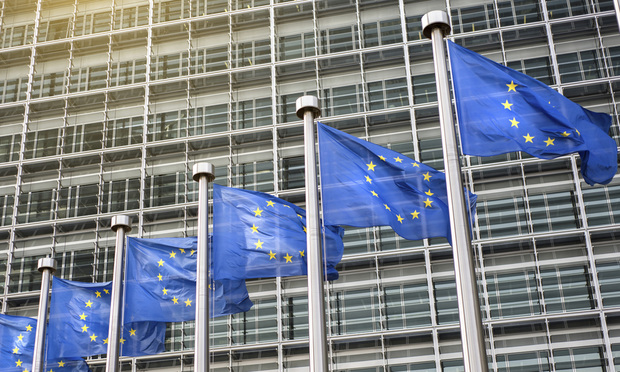Mandatory Human Rights Due Diligence: What You Need to Know
The European Commission is to introduce a legislative initiative by 2021.
June 22, 2020 at 01:03 AM
5 minute read
 European Union flags in front of the European Commission in Brussels, Belgium.
European Union flags in front of the European Commission in Brussels, Belgium.
On 29 April 2020, the European Commissioner for Justice, Didier Reynders, announced that the European Commission will develop legislation that would require companies to carry out due diligence to identify, account and mitigate for adverse human rights and environmental impacts in their supply chains.
The Commissioner confirmed that a legislative initiative would be introduced by 2021. Details of the exact legal mechanism will follow, but according to the Commissioner, any legislation would be "inter-sectorial, mandatory and of course with a lot of possible sanctions".
Existing non-legal incentives suggest that companies should already be reviewing and reinforcing their management of human rights and environmental risks – with a particular focus on supply chain responsibilities. The Commission's legislative commitment, and the COVID-19 pandemic, will only serve to accelerate this prerogative.
The Commission's legislative commitment follows the publication of a study in February 2020, commissioned by the Commission, which assessed options to regulate human rights and environmental due diligence in supply chains. The study indicated a need for policy change and revealed widespread support among business respondents for introducing mandatory measures.
The study acknowledged that national due diligence legislation is increasing: France and the Netherlands have their own human rights due diligence laws, and there are national movements for similar legislation in a number of other countries including Germany, Finland, Austria, Denmark, and Switzerland. Legislative requirements for mandatory disclosure of a specific human rights risk – modern slavery in a company's supply chain – have also increased in the recent years, with domestic laws in the UK , Australia and California , and similar laws proposed in Hong Kong and Canada.
Some multinationals have argued that an EU-level mandatory human rights diligence law would "level the playing field" and increase legal certainty in the face of a "patchwork" of different domestic obligations. There is growing evidence that investors also support such measures: in April 2020, a group of 101 international investors representing over US$4.2 trillion in assets issued a joint call for greater regulatory measures requiring companies to carry out human rights due diligence. Civil society and NGOs have also been campaigning for an EU-level law.
Furthermore, the health, social, and economic crisis caused by COVID-19 is "fast becoming a human rights crisis". The study pre-dates the pandemic, but it was launched by the Commission as part of its sustainability strategy; the Commission considers that the pandemic shows the "critical need" to strengthen sustainable practices. COVID-19 will serve to focus attention on the results of the Study and arguably increase the imperative for this legislative initiative.
What does this mean for businesses?
The Commissioner has suggested that the law will contain an enforcement mechanism and sanctions that could be coordinated by domestic authorities with oversight at the EU-level. He further indicated that the legislation will be based on the United Nations Guiding Principles on Business and Human Rights ("UNGPs"), OECD and ILO frameworks, and will be cross-sectorial. The impact of the law is likely to extend beyond companies incorporated in the EU, and, as a leader in sustainable policy, the EU's law could trigger further regulatory developments around the world.
The study identified a number of existing business incentives to undertake due diligence in this context, including: reputational risks; investor requirements; and consumer expectations. These non-legal incentives have now become more relevant in circumstances where human rights are "at the frontline in the fight against COVID-19″ .
Some businesses are reacting to the crisis by guaranteeing workers' pay and supporting suppliers. However, there is increased attention on other businesses which are taking measures that are resulting in human rights and environmental violations – which the OECD has said "may in turn have longer-term legal and reputational effects on companies". The OECD is therefore calling on businesses to take a responsible business conduct approach in tackling the pandemic. A proper responsible business approach includes effective human rights and environmental due diligence, with a particular focus on supply chain issues
The study illustrated that there is a significant variance in current due diligences practices. More than two-thirds of business respondents reported their due diligence practices to include training on human rights or environmental impacts, supplier codes of conduct and audits. Internal and external investigations and engagement with human rights and environment experts were other steps adopted by a minority of business respondents.
Businesses should take note of these emerging best practices and ensure their existing policies and procedures are in line with the standards under the UNGPs. This will allow businesses to position themselves for the impending EU law, and manage the increased scrutiny on supply chains as a result of the pandemic.
Sam Eastwood is a partner and James Ford and Libby Reynolds are associates in Mayer Brown's Litigation team.
This content has been archived. It is available through our partners, LexisNexis® and Bloomberg Law.
To view this content, please continue to their sites.
Not a Lexis Subscriber?
Subscribe Now
Not a Bloomberg Law Subscriber?
Subscribe Now
NOT FOR REPRINT
© 2025 ALM Global, LLC, All Rights Reserved. Request academic re-use from www.copyright.com. All other uses, submit a request to [email protected]. For more information visit Asset & Logo Licensing.
You Might Like
View All

Pallas Partners Founder On the Disputes Trends to Look Out For in 2025
4 minute read
What to Expect From Teresa Ribera, the EU‘s New Competition Commissioner
6 minute readLaw Firms Mentioned
Trending Stories
- 1Uber Files RICO Suit Against Plaintiff-Side Firms Alleging Fraudulent Injury Claims
- 2The Law Firm Disrupted: Scrutinizing the Elephant More Than the Mouse
- 3Inherent Diminished Value Damages Unavailable to 3rd-Party Claimants, Court Says
- 4Pa. Defense Firm Sued by Client Over Ex-Eagles Player's $43.5M Med Mal Win
- 5Losses Mount at Morris Manning, but Departing Ex-Chair Stays Bullish About His Old Firm's Future
Who Got The Work
J. Brugh Lower of Gibbons has entered an appearance for industrial equipment supplier Devco Corporation in a pending trademark infringement lawsuit. The suit, accusing the defendant of selling knock-off Graco products, was filed Dec. 18 in New Jersey District Court by Rivkin Radler on behalf of Graco Inc. and Graco Minnesota. The case, assigned to U.S. District Judge Zahid N. Quraishi, is 3:24-cv-11294, Graco Inc. et al v. Devco Corporation.
Who Got The Work
Rebecca Maller-Stein and Kent A. Yalowitz of Arnold & Porter Kaye Scholer have entered their appearances for Hanaco Venture Capital and its executives, Lior Prosor and David Frankel, in a pending securities lawsuit. The action, filed on Dec. 24 in New York Southern District Court by Zell, Aron & Co. on behalf of Goldeneye Advisors, accuses the defendants of negligently and fraudulently managing the plaintiff's $1 million investment. The case, assigned to U.S. District Judge Vernon S. Broderick, is 1:24-cv-09918, Goldeneye Advisors, LLC v. Hanaco Venture Capital, Ltd. et al.
Who Got The Work
Attorneys from A&O Shearman has stepped in as defense counsel for Toronto-Dominion Bank and other defendants in a pending securities class action. The suit, filed Dec. 11 in New York Southern District Court by Bleichmar Fonti & Auld, accuses the defendants of concealing the bank's 'pervasive' deficiencies in regards to its compliance with the Bank Secrecy Act and the quality of its anti-money laundering controls. The case, assigned to U.S. District Judge Arun Subramanian, is 1:24-cv-09445, Gonzalez v. The Toronto-Dominion Bank et al.
Who Got The Work
Crown Castle International, a Pennsylvania company providing shared communications infrastructure, has turned to Luke D. Wolf of Gordon Rees Scully Mansukhani to fend off a pending breach-of-contract lawsuit. The court action, filed Nov. 25 in Michigan Eastern District Court by Hooper Hathaway PC on behalf of The Town Residences LLC, accuses Crown Castle of failing to transfer approximately $30,000 in utility payments from T-Mobile in breach of a roof-top lease and assignment agreement. The case, assigned to U.S. District Judge Susan K. Declercq, is 2:24-cv-13131, The Town Residences LLC v. T-Mobile US, Inc. et al.
Who Got The Work
Wilfred P. Coronato and Daniel M. Schwartz of McCarter & English have stepped in as defense counsel to Electrolux Home Products Inc. in a pending product liability lawsuit. The court action, filed Nov. 26 in New York Eastern District Court by Poulos Lopiccolo PC and Nagel Rice LLP on behalf of David Stern, alleges that the defendant's refrigerators’ drawers and shelving repeatedly break and fall apart within months after purchase. The case, assigned to U.S. District Judge Joan M. Azrack, is 2:24-cv-08204, Stern v. Electrolux Home Products, Inc.
Featured Firms
Law Offices of Gary Martin Hays & Associates, P.C.
(470) 294-1674
Law Offices of Mark E. Salomone
(857) 444-6468
Smith & Hassler
(713) 739-1250









